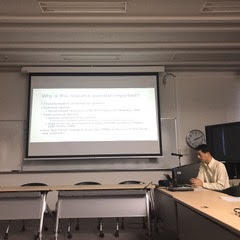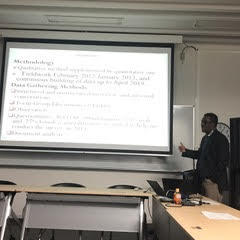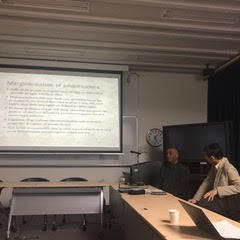Theme: Consequences of Land Tenure Reform in Africa
Date & Time: Tuesday, November 19, 2019 14:00 - 18:00
Venue: Inamori Center, Kyoto University
Report:
Session 1

Speaker: Shinichi Takeuchi, Director of the African Studies Center at Tokyo University of Foreign Studies-TUFS
Title: Consequences of the Land Tenure Reform: The Case of Rwanda
Dr. Takeuchi began his presentation by giving an overview of the effects of the Land Law Reforms introduced in the 1990s that aimed to promote tenure security such as the acceleration of commercialization of lands and large-scale land deals, but the speaker made clear to focus on state-building, as it was an under-researched perspective. Explaining the connection between the land law reform and state-building, the speaker argued that control over land has been in the center of state's political agendas and recent land law reforms could be utilized to reach this goal. He then presented the historical context of territorial control during the colonial and post-colonial period. Looking at patterns, the speaker mentioned that there are two perspectives to analyze state building in this context: the chief's power and the dominant party's power. In the case of Rwanda, the presenter argued that the land sharing, inheritance law, registration and land consolidation have been effective and efficient measures but concluded that it is questionable that this policies would be sustainable due to an incomplete control over rural lands. This presentation opened the interaction between presenters and participants. During the Q&A, the discussion revolved around methodological questions, the concept of state-building, the separation between chief's power from state power, the perception of tenure security, the Rwandan regime's legitimacy and security as well as the impact of the reform in productivity.
Session 2

Speaker: Dr. Teshome Emana, visiting professor at the African Studies Center at Tokyo University of Foreign Studies
Title: Urban Land Deal, Competing Perceptions, and Actors' Network in the Suburbs of Addis Ababa City, Ethiopia
Dr. Emana initially addressing the main objectives of his research: to explain the overall picture of land market in the Laga Tafo-Laga Dadhi town. Then, he explained that there are two main competing perceptions of land, the traditional perception of land as the main source of livelihood and the Hopi people's perception of earth as a living mother to all life mentioning as an example how the Oromos always mention earth (lafaa) when they talk about God. Then the speaker made an in-debth discussion of the importance of this perspectives for sustainability but argued that this perception is now being contested. He proceeded to explain this argument by showing quantitative evidence of the commoditization of land resulting in many types of disputes over land. He also discussed the reasons behind the land conflicts due to weak law enforcement, dissatisfaction over compensation and land prices, access to markets and deterioration of living conditions. He also presented cases of resilience by the communities against land sales and the management of these tensions. He concluded that the main issue is a distorted state-society relation in which land is seen as a commodity instead of a community. During the Q&A session, topics related to the Oromo's perception of God, methodological aspects of the research, and land policies and ownership were discussed.
Session 3

Speaker: Dr. Kojo Amanor, visiting professor at the African Studies Center at Tokyo University of Foreign Studies-TUFS
Theme: Community, State and Chiefs: Administrative Land Reform and Commodification in Ghana
Dr. Amanor started his presentation introducing two distinct relationships in the land question: the market relationship where land is acquired for production, residence and financial speculation, and the framework of governance with the notions of community, privilege, social welfare and equity. The speaker then explained the historical evolution of the case of Ghana whose traditional authorities have strong powers vested by the 1992 constitution. He pointed two factors behind this: the internal coalitions of power in political administration and capital accumulation and their historical precedents ,and the convergence of interests between international financial institutions and governments. This statement was followed by a brief history of the land tenure systems in Ghana, and the contradictions in indirect rule caused by the export crop production. Chiefs were empowered by the colonial government to represent the community and its traditional values, but their privileges gave them rights to sell and expropriate land and extract services from their subjects. This led to increasing dissatisfaction of the people with chiefs and indirect rule. After independence, the parties in power did not improve peasants tenure security but in fact, reinforced the chiefs authority to enable land to be appropriated for large-scale commercial agriculture. Talking about the present, the speaker mentioned some points of tensions in land administration which are related to the chiefs' continuous interest to expropriate lands to sell to foreign investors, the increase expropriation of farmers with insecure rights, violent conflicts between neighboring traditional authorities, the displacement of smallholders by the growing medium-scale farmers and the rapid expansion of residential plots in the peri-urban areas. In his concluding remarks, the speaker pointed to challenges that farmers face that perpetuate their marginalization, mainly their weakness against the local chiefs due to the former's alliance with the state and the new forms of commodification that increase social differentiation weakening furthermore the peasants. The participants asked, during the Q&A session, about the nature of the government's support of local chiefs and power relations between the two as well as the interplay between democratization, inequality and increased marginalization in Ghana.
Session 4
Speaker: Dr. Shuichi Oyama, Associate professor at Kyoto University
Title: The Chiefs Authority and Local Beneficiaries in the Customary Land under the Land-market Reform of 1995 Land Act in Zambia
Dr. Oyama began his presentation by highlighting the importance of land allocation and land tenure security ,and explained the dual system of tenure in Zambia. The speaker proceeded to present three important goals of the 1995 Land Act in Zambia: to strengthen the right of title deeds, to ease restrictions on foreigners' access to land, and to change the administration of the customary land tenure. The speaker then gave a description of the case of study, the MK village inhabited by the Bemba ethnic group, their agricultural practices, the chiefdoms, and customary land. Then, he described the resettlement scheme of the Zambian government and the acquisition of 1,250ha and a further acquisition of 12,500ha led the village members to suffer from hunger as an example of how private interests of the chiefs affects the community, followed by a description of a different atitude of newer chiefs who protected the community rights. In his concluding remarks, the speaker addressed four key-points that can be inferred from the case. First, he explained how the chiefs' approval is essential to obtain a formal land title from the Ministry of Land and noted that the governance recognition of the chiefs as central to regional development further strengthens this authority, where chiefs also have the right to void former land allocations as was done by the last chief. The speaker also argued that the local administration was dependent on chiefs' character, either to abuse their power or protect and improve their communities. Thirdly, the new local acquirers of lands were retirees who sought land in third communities in fear of witchcraft derived from jealousy. Finally, that the trend of land acquisition would accelerate, while the land ownership would be defined in complicated political dynamics of the stakeholders.
In the Q&A time, speaker and participants discussed, how chiefs balance the interests of outsiders and residents, the origins of the chiefs' legitimacy, the government's view on private tenure systems, the coexistence of the dual systems, the impact of titling in dispossession, and the reason behind governments weakness in chiefdoms.

